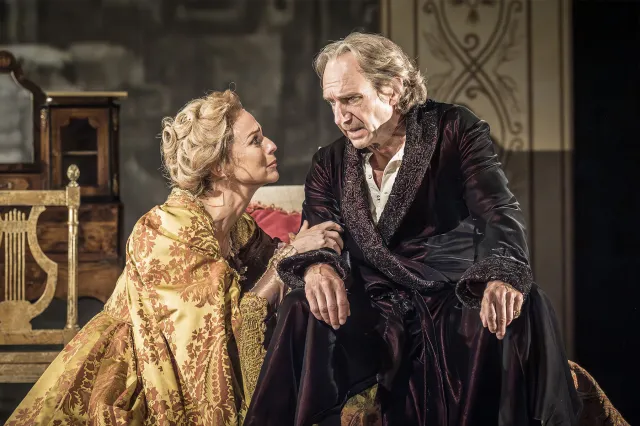Grace Pervades with Ralph Fiennes and Miranda Raison at Theatre Royal Bath – review
The world premiere of David Hare’s play runs until 19 July

The mantle keeps passing — from Garrick to Irving, Olivier to McKellen, Branagh to Fiennes. The British stage has long been haunted, and blessed, by the figure of the actor-manager-men (and it is always men) who lead from the front, carving mythologies with their presence. They carry with them a ghostly glamour, a whiff of footlights and sweat, of single-minded pursuit, of ego cloaked in artistry. The theatre world has shifted – once about writers, now perhaps about directors – but no medium lifts the leading actor so high, nor demands quite so much.
And here comes Ralph Fiennes, the pale priest of precision, beginning his season at Theatre Royal Bath with Grace Pervades, David Hare’s new work. He steps into the worn shoes of Henry Irving, Victorian titan, Dracula prototype, and casts a spell that hums. He does not impersonate Irving; he summons him. There is fire in his tread, a leg that drags like the weight of fame, and an unwillingness to meet the gaze of others as if the stage is the only place he can bear to be truly seen.
Fiennes’ voice, reedy yet imperial, carries secrets. His eyes speak of haunted depth. Perhaps it is not a great performance, but it is unmistakably the work of a star: focused, luminous, magnetic. If you have come for Fiennes, you will leave with your money’s worth. But the play around him does not rise to meet him.
Grace Pervades seeks to explore the strange inheritance of art, how one generation inspires, binds, and inevitably repels the next. It should be catnip for theatre lovers, for those of us who collect biographies and whisper names like talismans. And yet, when Edward Gordon Craig steps forward early to declare that theatre should cease if it has nothing to say, we’re left wondering if Hare has taken heed of his warning.

The play’s structure is its undoing. At its heart lies the rich, electric thread between Irving and Ellen Terry, his muse, his equal, perhaps his lost possibility. Miranda Raison is exquisite – high of cheekbone, porcelain of skin – in a performance that gently grows from admiration to hard-earned artistic defiance. Ellen finds herself through art: through the daring act of wearing black as Ophelia, through her refusal to be diminished by the gravity of male genius. She is a modern light in a gaslit world, and Raison plays her with elegance and bite. Together, she and Fiennes shape a duet of souls, two forces orbiting, colliding, receding. Their scenes are muscular and vivid.
But Hare wanders. He follows Terry’s children into their presents, and there, the spell begins to fade. Gordon Craig (Jordan Metcalfe) was, in life, a visionary, a difficult prophet of modern stagecraft. But here, he is reduced to theory: a voice rather than a heartbeat. He speaks of drama as abstraction, while we long for the blood of theatre. Edith Craig (Ruby Ashbourne Serkis) is drawn with more warmth, her populist mission given a tender glow – but her narrative, too, dims against the blaze of Fiennes and Raison. Hare’s democratic instinct to give equal weight to each strand leaves the fabric loose, fraying at the edges.
Jeremy Herrin’s production is clean and careful, its opening tableau – figures emerging from the mist like memories – its most poetic gesture. Bob Crowley’s set and Akhila Krishnan’s video design straddle past and future, both ornate and bare, ghostly, and real, with the theatre itself revealed, bones and all.
Grace Pervades is a meditation on legacy, a play that knows how to honour its lead but loses its way among the echoes. Still, Fiennes cuts through the fog, chasing ghosts, chasing greatness; a man walking the same boards as his predecessors, determined not just to remember them, but to meet them, eye to eye.















